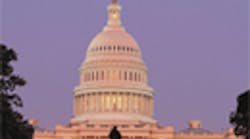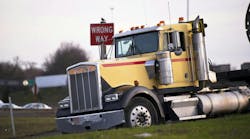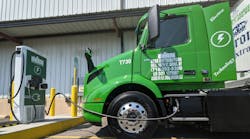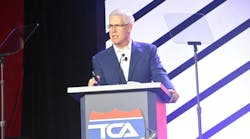The U.S. House of Representatives has passed a measure to transfer $8 billion from the Treasury’s general fund to the Highway Trust Fund. The bill was sent to President Bush to sign late yesterday. The measure passed by a 376-29 vote after a number of Senate Republicans dropped their opposition to the House version of the bill.
According to the American Road and Transportation Builders Association (ARTBA), not pumping up the fund would have meant the loss of 379,537 construction jobs and caused a shortfall of more than $14 billion in projected 2009 fiscal year expenditures.
“Restoring the $8 billion to the Trust Fund is appropriate because these funds represent highway user revenues that were intended to be used for highway purposes,” said Rep. James Oberstar (D-MN), Chairman of the Committee on Transportation and Infrastructure. “In 1998, these amounts were viewed as unnecessary to support highway program funding levels and were therefore shifted to the General Fund.”
“We’re pleased to see that the Administration and Congress recognize the significant need to sustain the nation’s infrastructure, which is a vital link to the health of the U.S. economy,” said American Trucking Assns. (ATA) president & CEO Bill Graves. “Restoring these critical funds is an important step in solving the complex problem of funding our transportation network.”
The Bush administration originally opposed transferring money from the general fund, referring to it in July as “both a gimmick and a dangerous precedent that shifts costs from users to taxpayers at large.” However, Dept. of Transportation Secretary Mary Peters said earlier this week that the President would sign the bill.
"Congress has acted quickly to protect states from the pain of a funding shortfall in the highway trust fund, but the fundamental funding flaws that plague the nation's transportation system will continue to wreak havoc if left unfixed,” Peters said after Congress approved the bill. “Congress must now address the obvious need for meaningful reforms to improve the way we raise and invest transportation funds, as this Administration has proposed and requested for years. I urge members to do so with the same bipartisan spirit and energy they demonstrated in voting for these additional resources."
The passage of the measure was welcomed by construction and manufacturing organizations that feared delay in Congress would lead to the loss of jobs and revenue for their constituents, and now wish to see a comprehensive infrastructure philosophy adopted.
"We're relieved that the Administration finally decided to join us in supporting this fix and that Congress was able to get it done quickly," said Stephen E. Sandherr, CEO of the Associated General Contractors of America (AGC). "We can now turn our focus to working with Congress on the heavy lifting that will ensure a strong, well-funded program in the future."
“As this averted crisis has demonstrated, we need a comprehensive approach to fund, build and maintain America's key transportation systems -- the highways, bridges and mass transit systems that every American relies on,” said Terence M. O'Sullivan, general president of the Laborers' International Union of North America (LIUNA). “We need a new vision for how we take care of the basics in this country. With more than 150,000 unsafe bridges and the average American spending more than $1,000 a year in wasted gas due to traffic, it is clear that America's transportation situation is only getting worse and we can no longer rely on last minute stop-gap measures and band-aid fixes when it comes to building America.”
With the highway fund bill just a signature away from being law, attention has been shifted to passing the Senate version of H.R. 3999, which makes changes to the requirements of the Highway Bridge Program while authorizing a one-time $1 billion transfer in funds towards additional bridge repair and replacement. The bill passed in the House on July 24th by a 357 to 55 vote.
“According to the U.S. Department of Transportation's 2006 Conditions and Performance Report, the average annual cost to eliminate the repair backlog and fix other problems that are expected to develop between now and 2024 would be $12.4 billion annually from all levels of government,” said Sen. Barbara Boxer (D-CA), Chairman of the Committee on Environment and Public Works. “Total capital spending on bridges by all units of government in 2004 (the latest available figures) was $10.5 billion.”
“This bill will create a framework that will allow states to target inspections on those bridges that need to be watched closely, and will direct limited resources to those bridges most in need of repair,” Oberstar said. “This bill includes a requirement that structurally deficient bridges and bridges with fracture critical members are inspected at least annually, utilizing the most effective technologies and inspection methods. Many states currently meet this standard. This provision will ensure that all states do. This will raise the overall safety and reliability of state bridge inventories.”
Related articles:
- Senate approves $8 billion for Highway Trust Fund
- Trust fund rescue has wide support
- DOT seeks $8 billion to pump up Highway Trust Fund
View more Management news and other trucking industry news from Fleet Owner.




